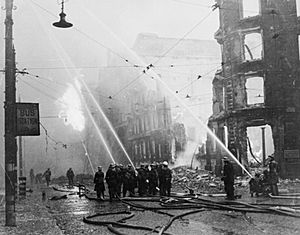Manchester Blitz facts for kids
Quick facts for kids Manchester Blitz |
|||||||
|---|---|---|---|---|---|---|---|
| Part of the Strategic bombing campaign of World War II | |||||||
 Firefighters putting out a blaze at a bomb site in Manchester city centre |
|||||||
|
|||||||
| Belligerents | |||||||
| Casualties and losses | |||||||
| Unknown | 1,000 | ||||||
The Manchester Blitz was a time when the German air force, called the Luftwaffe, heavily bombed the city of Manchester and nearby areas in North West England. This happened during World War II. People also called it the Christmas Blitz because some of the worst attacks were around Christmas.
Manchester was a very important city. It was a big port even though it was inland, and it had many factories that made things for the war. For example, Trafford Park in Stretford was a key place for making war supplies.
Contents
Bombing Attacks on Manchester
Air raids on Manchester started in August 1940. In September 1940, the Palace Theatre on Oxford Street was hit.
The Christmas Blitz: December 1940
The most intense attacks happened on the nights of December 22nd and 23rd, 1940. During these two nights, about 684 people were killed. More than 2,000 people were also injured.
Many large buildings were damaged. These included Manchester Cathedral, the Royal Exchange, the Free Trade Hall, and the Manchester Assize Courts.
On the first night, 272 tons of high explosive bombs were dropped. The next night, another 195 tons fell. Nearly 2,000 incendiary bombs (bombs designed to start fires) were also dropped.
The German planes spread out over the city. They dropped flares first to light up targets. Then they dropped incendiary bombs and high explosives. Later waves of planes aimed for the fires that had already started.
Two German planes were lost over Britain on December 24th. One crashed into the sea near Blackpool. The other, full of bombs, crashed in flames near Sussex.
Impact on Nearby Areas
Neighbouring areas like Salford and Stretford were also badly damaged.
Salford and Stretford Damage
In Salford, it's thought that over 215 people were killed. About 910 people were injured. More than 8,000 homes were either damaged or completely destroyed.
In Stretford, 73 people were killed. Many more were injured there too.
In June 1941, German bombs hit the original Salford Royal Hospital. This was on Chapel Street. Fourteen nurses sadly died in this attack.
Later Bombing Raids
The bombing of Manchester continued throughout the war.
Old Trafford Stadium Hit
On March 11th, 1941, Old Trafford football stadium was hit. This is the home of Manchester United F.C.. The bomb was meant for the factories at Trafford Park. The stadium's playing field was wrecked, and the stands were destroyed.
The stadium was rebuilt after the war. It reopened in 1949. Until then, Manchester United played at Manchester City's Maine Road stadium.
V-1 Flying Bombs
In June 1941, German bombs also damaged the police headquarters. Later in the war, Manchester became a target for airborne V-1 flying bombs. These were like early cruise missiles.
On Christmas Eve 1944, German Heinkel He 111 bombers launched 45 flying bombs. They flew over the Yorkshire coast and aimed for Manchester. No V-1s actually landed in Manchester itself. However, a stray bomb killed 27 people in nearby Oldham. Another 17 people died elsewhere, and 109 were wounded overall.
RAF De Havilland Mosquito planes shot down one German bomber over the North Sea. They also badly damaged another, which crashed in Germany.
See also
 | Bayard Rustin |
 | Jeannette Carter |
 | Jeremiah A. Brown |

